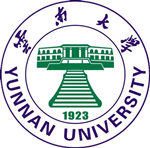School Badge

About Yunnan University
Yunnan University was founded in 1922, when it was Private Donglu University. In 1934, it was renamed as Provincial Yunnan University and in 1938 renamed as National Yunnan University. It is one of the earliest comprehensive universities in Southwest China. In 1937, when Xiong Qinglai, the well-known mathematician and educationist, served as the president, a large number of renowned scholars were employed to teach at the university, which laid foundation for its development and profound academic tradition, leading to the first glorious era in the history of Yunnan University. In 1940s, Yunnan University developed into one of the famous large universities in China with international influence and offered courses in arts, law, science, engineering, agriculture and medical science. In 1946, Yunnan University was listed by Concise Encyclopedia Britannica as one of the 15 world’s famous universities in China.In 1950s, when Yunnan University was under the direct administration of the Ministry of Education, the national faculty restructuring was introduced. Some important featured departments, like aeronautics, civil engineering, law, and railway spun off from Yunnan University and merged into colleges like Beijing Aeronautical and Astronautical Institute, Sichuan University, Southwest University of Political Science and Law and Changsha Railway Institute. Departments like engineering, medical science and agriculture were also divested from the University and gradually developed into today’s Kunming University of Science and Technology, Kunming Medical University, Yunnan Agricultural University and Southwest Forestry University, etc. In 1958, the administrative management of Yunnan University was delegated from the central Ministry of Higher Education to Yunnan province. In 1978, it was ranked by the State Council as one of the 88 national key universities.
Since the reform and opening-up, Yunnan University has made huge progress. In 1996, it was among the first universities to win the membership of “Project 211”. In 2001, it was listed as one of the higher education institutions to be intensively supported in China’s development of its western region. In 2004, it became a key university to benefit from focused support from the People’s Government of Yunnan and the Ministry of Education. In 2006, all its 19 secondary indicators were A-graded and it was rated as an excellent college for undergraduate education by the MOE. In 2012, it became a participant of the Central-western Chinese Universities Capacity-building Project, and a participant in the Central-western Chinese Universities Comprehensive Capacity Promotion Project. In 2016, it was included in the Comprehensive Strength Improvement Project of Colleges and Universities in Central and West China. In 2017, it became one of the first 42 first-class universities in China. In 2018, it became one of the 14 universities in central and western China that were jointly supported by the Ministry of Education and local provincial governments.
Yunnan University has now gathered a galaxy of talents in liberal arts, science, law, technology, economics, agriculture, medicine, business administration, and fine arts, and has developed into a modern university featuring ethnology, biology, resource development and environmental protection, borderland research, and Southeast Asia and South Asia research. According to a recent discipline ranking released by the MOE, its ethnology, ecology and political science programs rank 2nd, 6th and 10th respectively in the country. According to the 2012 Essential Science Indicators, biology and chemistry at Yunnan University were among the top one percent of the world’s academic disciplines.
Yunnan University consists of 26 schools, 10 research institutes, two independent schools, one affiliated hospital and a graduate school. There are 2,017 teaching and research personnel in professional and technical positions, among whom 1,219 have doctorates. The university has 16,816 full-time undergraduate students, 8,159 master’s degree students, 1,215 PhD students and 1,545 international students. It has 79 majors in undergraduate programs, 12 state-level featured majors, two state-level professional comprehensive pilot reform programs, 10 state-level quality courses, three state-level publicly-available quality courses. A total of 21 of its primary disciplines are authorized to offer PhDs, 42 primary disciplines offer master’s degrees, and 22 disciplines offer professional master’s degrees. In the fourth round of discipline evaluation conducted by the Ministry of Education, 30 disciplines at the university featured among the top 70% in China, including two A-level disciplines (ethnology with an A+ rating and ecology with an A-) and 14 B-level disciplines. Chemistry, botany and zoology are among the top 1% of Essential Science Indicators (ESI) in the world. The university has developed into a comprehensive academic institution with a full range of disciplines and a concentration of top-flight talent — with ethnology, ecology, biology, resource development and environmental protection, as well as studies on frontier issues and international issues in Southeast and South Asia, seen as constituting its distinctive competitive advantages and chief characteristics. It has four national bases for talent cultivation, four national experiment teaching model centers, three national training programs for excellent engineers, one national educational training center for excellent practical and inter-disciplinary legal professionals, four national innovation experiment areas for talent cultivation model as well as one national pilot software school. At YNU, there is one national international joint center, one national cultural industry research center and one national college students’ cultural quality education base. In addition, there are 12 Ministry of Education research centers, observation stations and education bases.
The university’s faculty, programs, student body and commitments come together in the various projects it undertakes.
In recent years, it has independently presided over projects of the 973 Plan, the 863 Plan, and 25 major bidding projects of the National Social Science Foundation and MOE humanities and social science milestone projects.
These projects have had practical effect. The university’s report on the China-Myanmar Oil and Gas Pipeline helped the project start. Its achievements in Research on Cross-border Ecological Safety and International Rivers provided decision-making reference for solving issues related to water resources and the ecological health of rivers that flow across borders. Its research achievements in several projects, such as Dealing with Arsenic Pollution in Yangzonghai Lake, Ecological Rehabilitation and Dealing with Polluted Rivers and Investigation of Non-Point Source Pollution in Dianchi Lake and Controlling Measures have made key contributions to dealing with pollution in plateau lakes.
In addition to generating important practical effects, the projects have garnered many awards for the university. It has been awarded several national prizes, such as a first prize for National Natural Science Award, another first prize recognizing a National Higher Institutional Humanities and Social Sciences Outstanding Achievement and a second prize for National Science and Technology Progress, among others.
Pursuit of excellence underlies all of Yunnan University’s academics. A total of 15 papers by its professors have been published in world’s famous academic publications, like Nature and Science. It has also sponsored academic publications in arts and sciences like Yunnan University Journal and Ideological Front, one of 11 publications listed by the MOE in its Famous Publications Program.
The University, covering an area of 300 hectares, is divided into Chenggong Campus and Donglu Campus, with a public floor area of more than 814,000 square meters, asset value of more than 938 million yuan ($147.74 million) for teaching and scientific research instruments and equipment, and a collection of more than 3.82 million books in the library. The campus network is the main node of CERNET in Yunnan.
Looking into the future, Yunnan University will stick to its spirit of “wisdom from many, justice for all”, highlighting rule of law, establishment by virtue, developing by relying on academic research and talents. It will continue to explore the formation of modern university system, enhance its academic strengths, improve its education quality, strengthen its research capacity and social services, promoting its cultural inheritance and innovation capability. It is now working hard to become a regional first-class university that is “best in China, and famous throughout the world”.







